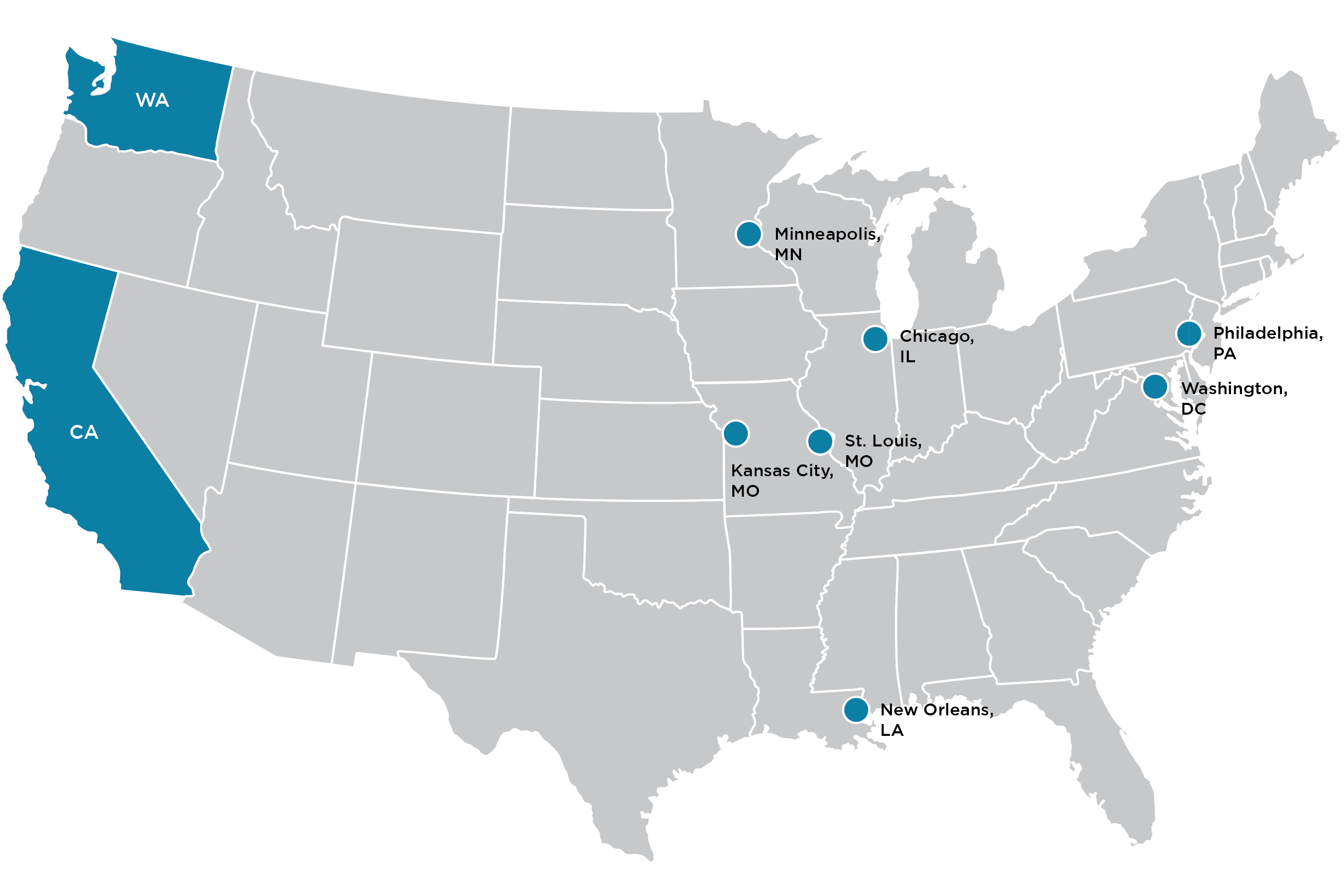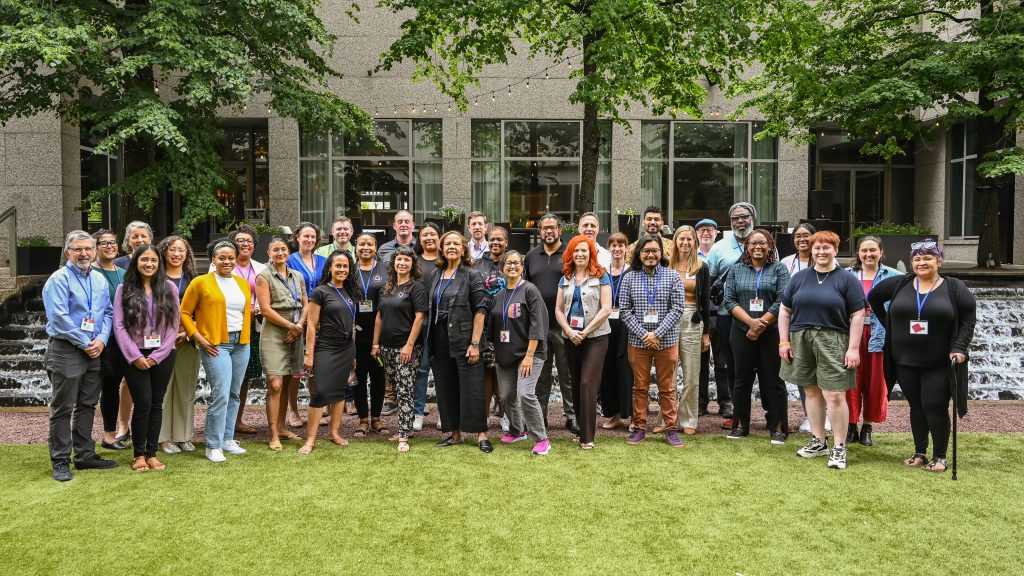
2024 is a big year for action on climate justice, sandwiched within a decade where reducing emissions is critical for climate stability. Between the Bipartisan Infrastructure Law and the Inflation Reduction Act, we have an unprecedented opportunity this year to leverage federal investment for climate and equity priorities. We believe balancing the urgency of our longer-term goals with action centering the impacts communities are already facing today, is the only way forward.
IMT and its partners are leveraging these federal funds for community-centered building performance policy development and implementation. In January, we were excited to kick off work under a $5 million Department of Energy award for Resilient and Efficient Codes Implementation that embodies this balancing act.
This project, titled Supporting Equitable Building Performance (SEBP), falls under the umbrella of our Community Climate Shift work, and allows us to model community-centered policymaking in 9 different places across the country, leveraging federal dollars braided together with philanthropic resources that invest directly in community partners to lead. Through this effort, we aspire to advance our practice of how to accelerate community-led building performance policy creation and implementation in multiple locations by creating strong, intersectional partnerships and identifying the solutions communities want to prioritize now around climate action.
Where We’re Working

In each of these places, IMT and our robust network of equitably focused decarbonization partners will be teaming up with community-based organizations with on-the-ground lived experience in the climate related issues that are happening locally, and city or state policymakers that have the ability to drive ambitious action. The goals of this project are to:
- Strengthen relationships between community stakeholders and government to shift power towards community ownership of policies and programs.
- Drive creation and implementation of community-led policy that will reduce energy and carbon from buildings and address resilience, grid impacts, occupant health, and job creation.
Our Partners
IMT’s collaborators include a network of experts in community engagement and equitable decarbonization.
People’s Climate Innovation Center (PCIC), IMT’s co-partner on all of our Community Climate Shift work, is leading our approach on community engagement and supporting the continued development of IMT’s Community Engagement team to put our Community Engagement Framework into action. In partnership with Facilitating Power, PCIC is advising on how the project will use the Spectrum of Community Engagement to Ownership tool to assess current community engagement efforts and encourage movement towards community ownership of the resulting policies or programs in each location. Our partners at Upright Consulting are also helping support the broader team to bridge this critical work with the implementation partners, leveraging their unique expertise in facilitating national scale initiatives focused on the intersection of building decarbonization and equity.

Equitable decarbonization partners will provide project management and layered technical assistance in each of the nine locations. The partners include Elevate, Emerald Cities Collaborative, New Buildings Institute, Greenlink Analytics, and Building Electrification Institute. Each partner has experience working on building policies and brings their own unique area of expertise in the many important intersecting areas that meet in our built environment.
With this strong group, we are hoping to evolve the way we as practitioners work to design policy and programs on the ground in order to bring forward how our buildings interventions can do more than reduce energy use or carbon emissions, but can simultaneously improve energy burden, protect tenants from displacement, improve indoor air quality and occupant health, and center traditionally marginalized communities in the gas transition. This is the next phase of our Social Priorities work, and part of our most recent Strategic Plan – to ‘Act at the Intersections’. The package of technical assistance tasks will be informed through our CBO partners and government priorities, and will include tasks such as affordable housing impact analyses, workforce assessments, equity mapping, building performance policy design, and incentive design and assistance.
Additional support partners include MEEA, NEEP, and NASEO, whose important participation will allow the team to scale learnings even further as well as align our effort with regional priorities. Further, the Department of Energy’s support allows IMT to support coordination across the other RECI awardees focused on building performance policy and we are excited to learn more and be in support of the many exciting projects being kicked off this year.
What’s next?
IMT and our partners will be working on this SEBP project over the next three years. We have just begun to bring community-based partners onboard, thanks to funding provided through Community Climate Shift and the guidance of the CCS Steering Committee, who vetted our partner recommendations through an inclusive decision-making process.
We are committed to sharing updates as we move forward with this important work so that we can communicate our lessons learned as federal funding opportunities continue to flow into climate action throughout this critical year. Let’s work together to lay the groundwork for equitable action during this important decade.
You can stay engaged in the project in one of the following ways:
- Contact Jessica Miller or Maddie Koolbeck if you see opportunities to collaborate in the listed locations.
- Visit the Community Climate Shift website to learn more about our approach and partners.
- Read more about intersectional policy and IMT’s previous work in this space through our Social Priorities resources collection.
- Support the funding for community-based organizations in these locations for years 2-3. Contact Betsy Law to support these communities!
- Sign up for IMT’s newsletter to learn more about the projects.
Acknowledgment: This material is based upon work supported by the U.S. Department of Energy’s Office of Energy Efficiency and Renewable Energy (EERE) under the Building Technologies Office – DE-FOA-0002813 -Bipartisan Infrastructure Law Resilient and Efficient Codes Implementation.
Legal Disclaimer: The views expressed herein do not necessarily represent the view of the U.S. Department of Energy or the United States Government.

